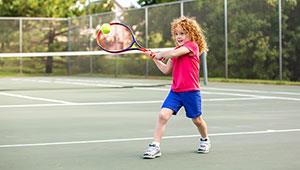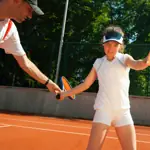
A big challenge for many junior tennis players today is that they are too concerned about what others think when they play.
Worrying about what others think is a huge distraction for your athletes to say the least and present others problems as well.
In general, you want your kids to be caring, right? However, caring too much about what others think about their game when playing a match is a major distraction. Your kids can't focus on each point and hit shots with freedom when they are looking for their parents' reaction after every point.
More: Strenght Training For Young Players
This is called social approval in my work as a mental game expert in tennis. Social approval causes young athletes to crave others' respect, admiration, or approval, especially parents and coaches. Likewise, some young athletes might even feel a need to avoid embarrassment, negative evaluation, or criticism from others--the basis for fear of failure. Your players can't focus on playing smart tennis when they worry too much about what others think!
For example, I worked with a young female tennis player who I'll call Lisa. Lisa lacked confidence in her tennis game and wanted to build her confidence. As we talked, it became clear to me that Lisa relied on other people for her confidence and feelings of self-worth. If her coach or opponent did not say, "good shot" to her after she hit a good shot, she would wonder why and lose confidence in herself. She relied too much on what others said.
She assumed that her coach really did not like her because she did not acknowledge when she hit a good shot. She would think to herself, "I guess my coach is not happy with how I am playing or thinks I am a crummy player," and then proceed to lose confidence. This process I call mind reading--when athletes makes false assumptions about what others think.
More: Drill of the Week: Tennis Split Step for Kids
In addition, she was afraid of embarrassing herself when she played in tournaments. Her goal was to not lose 0-6 and 0-6 for fear of what others would say to her about her game. More importantly, what would they think about her as a person?
Some tennis players go as far as defining their self-worth based on their performance on the court! Be aware when your players make statements such as, "I am a bad tennis player today, I guess I am a bad person." You might think this is a stretch, but this is how the mind of young athletes work.
What's the solution if you tennis kids crave approval from others? The answer is complex because it's often a reflection of kids level of self-esteem. But being aware of this issue is a good start for parents. The bottom line: you want to encourage your kids to play for themselves--their own goals--and not others'. You also want your athletes to let go of making assumptions about what others may or may not be thinking when they compete.
Young athletes have to understand that their on-court performance does not define them as persons. They must learn to respect themselves and thus let go of the need to gain approval from others.
 Find tennis camps for your ACTIVEkids.
Find tennis camps for your ACTIVEkids.
Dr. Patrick Cohn is a world-renowned sports psychology expert who works with nationally ranked tennis juniors. For more information, visit SportsPsychologyTennis.com.






Discuss This Article